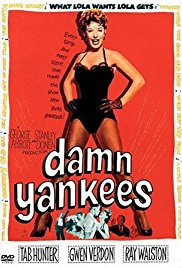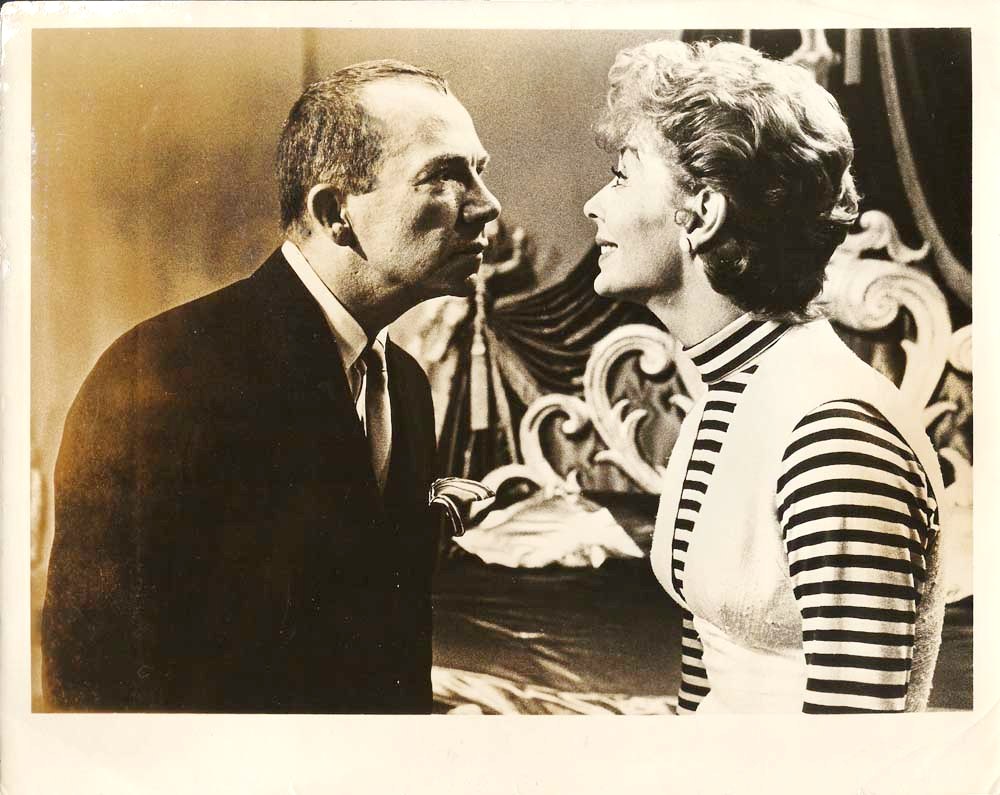A middle-aged couch potato baseball fan is enticed by the devil to trade his soul for youth and talent. The devil agrees to allow him to play professional baseball on his favorite team, the hapless Washington Senators. The fan becomes a star but …. Will he ever be able to return to his home and his couch?
This is a movie version of the Tony award-winning musical. The music and lyrics are by Richard Adler and Jerry Ross.
Selected Awards:
1958 Academy Award Nominations: Best Original Score.
Featured Actors:
Gwen Verdon, Ray Walston, Tab Hunter, Jean Stapleton, Russ Brown.
Director:
George Abbott, Stanley Donen.
This musical combines song, dance, and baseball. It will introduce children to the Faustian legend of making a bargain with the devil to sell one’s soul in return for rewards in this life, such as wisdom, knowledge, earthly pleasures or, in this case, an opportunity to play professional baseball.
This musical is fun and well-performed. It includes classic songs such as “Shoeless Jo from Hannibal Mo” and “Whatever Lola Wants, Lola Gets.” Ray Walston as the Devil is terrific (he won the Tony Award for his performance of the role on Broadway). Damn Yankees is not among the first rank of musicals such as South Pacific, My Fair Lady or Oklahoma!, but it is certainly entertaining and worthwhile.
MINOR. There is one dance number in which one of the Devil’s disciples wiggles all parts of her body in a parody of seduction. Some parents may object to this.
Describe for your child the legend of Faust which is set out very briefly in the Helpful Background section. Then ask and help your child to answer the Quick Discussion Question.
Since the sixteenth century, stories and works of literature have recounted variations on the Faust legend. All are characterized by a bargain with the Devil, originally called Mephistopheles, in which the main character sells his soul. Faust sometimes bargains his soul for years of pleasure. In other versions, he bargains for scientific and philosophical knowledge. Usually, in the end, Mephistopheles carries Faust’s soul to hell. In this musical comedy, the hero is able to outwit the Devil and stay out of hell.
The Faustian legend has many meanings. But one of them, and perhaps the simplest, relates to how we conduct our lives. If we get ahead by cheating, lying, stealing, or by cutting corners, we are making the bargain with the Devil: selling our conscience for money, possessions, advancement or advantage. The story of Dr. Faustus is a recurrent theme in Western culture because the theme of the story is a basic component of ethics.
In the 1950s and early 1960s, the New York Yankees were the best team in baseball. The Washington Senators were a hapless franchise with a reputation for losing.
Discussion Questions Relating to Ethical Issues will facilitate the use of this film to teach ethical principles and critical viewing. Additional questions are set out below.
RESPONSIBILITY
(Do what you are supposed to do; Persevere: keep on trying!; Always do your best; Use self-control; Be self-disciplined; Think before you act — consider the consequences; Be accountable for your choices)
1. This musical comedy turns the usual ending of the Faust legend on its head. The hero doesn’t have to pay the price and is not carried off to hell. But musical comedies are not to be taken seriously. Why is it important in the Faust legend that the character who makes a bargain with the Devil goes to hell in the end?
2. How does the legend of Faust relate to the ethical principle of Responsibility?
This Learning Guide was last updated on December 9, 2009.



